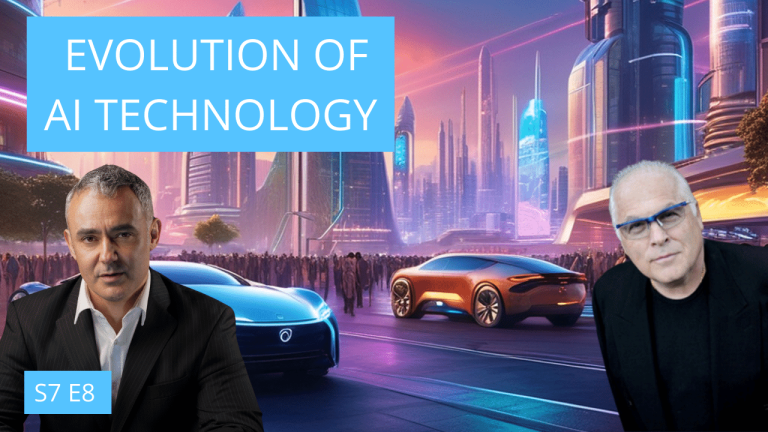In this podcast episode, Nat Schooler is joined by business expert Steven J. Manning to discuss the evolution of AI technology and the impact of AI on various aspects of life, including writing, video editing, political campaigning, and more.
We delve into the history of AI, its application in marketing and data analysis, and the ethical implications of AI technology. The conversation covers the use of AI in writing, research, and content creation, highlighting both the benefits and potential pitfalls of AI integration in various industries.
Here is the LinkedIn live: https://www.linkedin.com/events/7181736054943531008/about/?originTrackingId=Cut2aRzzQmKmbXk7ecsXdw%3D%3D
Get it on YouTube here: https://www.youtube.com/live/5Rp9Q1QdNvo?si=wotep_5750ObA9Q_
Topics discussed:
Evolution of AI Technology: Steven Manning shares his experience with AI dating back to the 1980s when AI was used in marketing for data analysis, predictive modeling, and decision-making processes.
Impact of AI on Writing and Content Creation: The discussion will touch on the use of AI tools like Copilot and Gemini for writing assistance, research, and content generation. We explore the balance between AI-generated content and original, creative writing.
Ethical Considerations of AI: The conversation delves into the ethical concerns surrounding AI, including data privacy, manipulative messaging, and the potential misuse of AI technology in elections and surveillance.
Future of AI and Technology: The hosts express excitement about technological advancements in weather forecasting, medicine, and operations while cautioning against reliance on AI leading to intellectual laziness and the importance of maintaining critical thinking skills.
Contents
The Evolution of AI: From Big Data to Intelligent Automation
Uncovering the Roots of Artificial Intelligence
In this insightful conversation, business expert Stephen J. Manning takes us on a journey through the evolution of AI technology. He shares his personal experiences and insights, revealing how the foundations of artificial intelligence were laid long before the modern AI revolution.
Manning recounts his early days in the marketing industry, where he and his team were already harnessing the power of “big data” and “data mining” to develop predictive models and decision-making frameworks. This, he explains, was the precursor to what we now recognize as artificial intelligence.
“So let me just put it in a simple formula using the really slick words that are being used everywhere by everyone. Big data. Well, we had big data. At the time, 2 or 3,000,000,000 data points is is big data. Remember, this is the eighties now. And then we did data mining. Well, we integrated the data. It’s obvious we had it. And then we develop predictive models for data. Well, just a few years earlier, we calls regression models, but predictive models. Not once we had those predictive models, we then use those to create decision making models. No. Add that up, big data, data mining predictive models, create decision making paradigms, etcetera. What the heck is that? It’s AI, isn’t it? It’s artificial intelligence.”
The Limitations and Advancements of AI
While the foundations of AI were present in the 1980s, Manning acknowledges that the technology of that era was limited by the available computing power, data storage, and data transmission capabilities. However, he highlights the remarkable advancements that have since transformed the landscape of AI.
“Of course, we did not have the computing power. Though we have now, and the computing power power we have now is massive, and damn near free. And then we didn’t have this incredible unlimited bandwidth to transmit all this data. You know, we have it now, and it’s so incredibly ex inexpensive.”
Manning emphasizes that the current iteration of AI is not only quantitatively better but also qualitatively superior, thanks to the exponential growth in data, computing power, and connectivity.
The Challenges and Concerns Surrounding AI
Despite the remarkable progress in AI, Manning raises important concerns about the potential misuse and abuse of the technology. He draws parallels to the ethical debates surrounding genetic engineering, emphasizing the need for responsible development and deployment of AI.
“I think about it, in context of what are major, major advances in sciences or technology in in my lifetime where, you know, it it it there’s an inflection point. There’s a Rubicon where it hits the wall. Is there a time when there will be a revolution among working populations against AI taking over their jobs? Which AI can, in fact, take over a lot of jobs because sheer computing power.”
Manning’s concerns extend to the impact of AI on the creative process, particularly in the realm of writing. He expresses his reservations about the potential for AI-generated content to diminish the authenticity and originality of human expression.
The Responsible Use of AI
While acknowledging the immense potential of AI in various domains, Manning emphasizes the importance of maintaining a cautious and responsible approach. He suggests that the integration of AI should be guided by a deep understanding of its capabilities and limitations, as well as a commitment to preserving the uniqueness of human creativity and decision-making.
“Technology is here, guys. It’s not supposed to encourage you to work harder. It’s supposed to encourage you to work smarter, be more accurate, be more thoughtful.”
By embracing the positive aspects of AI while remaining vigilant about its potential pitfalls, Manning believes we can harness the power of this transformative technology in a way that benefits humanity as a whole.
Tune in and comment or reach out directly as we would love to hear from you.

